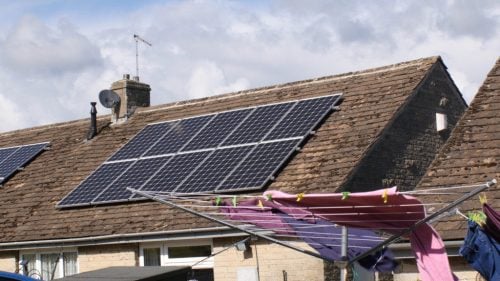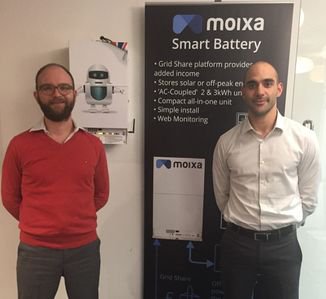The organizers of a ground-breaking home battery trial in Barnsley in the United Kingdom are hoping it will help electricity consumers with solar panels make better use of their renewable energy and save money.
Northern Powergrid, Moixa, and Energise Barnsley are running the trial to show how home battery clusters can increase network capacity and enable more homes to install solar panels to make electricity.
 Council tenants in Barnsley, UK, are taking part in a trial to see how much money they can save by adding a home battery to their solar energy system. Image: Energise Barnsley
Council tenants in Barnsley, UK, are taking part in a trial to see how much money they can save by adding a home battery to their solar energy system. Image: Energise Barnsley
The Moixa smart batteries are to be installed in 40 council-owned homes in Oxspring, near Barnsley.
Northern Powergrid, an electricity distributor, is funding the installation.
Energise Barnsley is a community-owned scheme set up by Barnsley Council that is rolling out solar power to council homes in the area.
Batteries can cut bills by another 20 percent
Having a home battery allows the electricity consumer to collect electricity when it is cheap and store it to use when they wish.
The electricity can come either off-peak from the grid or – if they are installed – from solar panels.
Another advantage is that the consumer can also sell electricity back to the grid.
Northern Powergrid says consumers can expect to cut their electricity bills by up to 30 percent by installing solar panels.
With a home battery, they could add further savings of up to 20 percent from using free energy collected during the day at night.
Andy Heald, Director of Energise Barnsley, says, “Battery costs are falling rapidly and storage has huge potential to accelerate the national roll-out of solar and improve the lives of vulnerable people.”
The highs and lows of intermittent supply
The challenge we face in making better use of energy sources like solar and wind is that, with present technology, you can only produce energy when the sun shines or the wind blows.
Unlike a power plant where you can switch the supply on and off to meet demand, you cannot rely on renewable resources to provide power as and when you need it.
 The first home batteries are due to be installed at the end of January.
The first home batteries are due to be installed at the end of January.
So, at present, residents in homes with solar panels rely on being able to get electricity from the grid to help balance demand with supply.
Also, if it is a very sunny day and their panels are producing more electricity than they need, they have the possibility of selling their excess to the grid – as long there is demand for it.
However, once you introduce the possibility of storage, it allows feeding of solar-generated electricity into the grid in a timed fashion – in line with fluctuating demand.
The result is the consumer makes more money, and more of the energy flowing around the grid comes from renewable sources.
Virtual power plant
The cluster of 40 home batteries in the scheme form what is known as a “virtual power plant” that can feed power into the grid in a controlled way like a physical power plant that makes electricity from coal or gas.
To maximize the benefits of storage, Moixa’s software includes learning algorithms that respond to solar generation, the needs of the grid, and the behavior patterns of the consumer.
Linking the home batteries together in a virtual power plant enables the system to provide services – such as maintaining a stable frequency – that help improve the efficiency of the wider grid and reduce the need for back-up power from fossil fuel plants.
In the future, Moixa will also be giving the tenants a share of the income they will get for providing these grid services.
The first batteries are due to be installed at the end of January. Residents will not have to pay for their home battery or its installation.
Higher levels of low-carbon renewable power
Berneslai Homes, who manage the council houses taking part in the trial, are keen to explore the savings potential that having a home battery can bring to their tenants’ bills. Stephen Davis, a director with the firm, says:
“Our tenants face ever increasing energy costs from the energy suppliers they buy their electricity from and solar panels coupled with battery technology have the potential to ease some of that cost.”
Northern Powergrid are also hoping the trial will show the potential savings that UK network operators could make by going down similar route because there would be less need to upgrade infrastructure.
Simon Daniel, CEO of Moixa, says that batteries also allow the electricity system to support much higher levels of low-carbon renewable power and increase UK energy independence. He adds:
“By managing clusters of home batteries in a virtual power plant and allowing homeowners to use more of their solar energy, thereby exporting less, we believe we can significantly reduce peak solar generation output onto the network. This will allow more homes to go solar without imposing new costs on network operators.”
